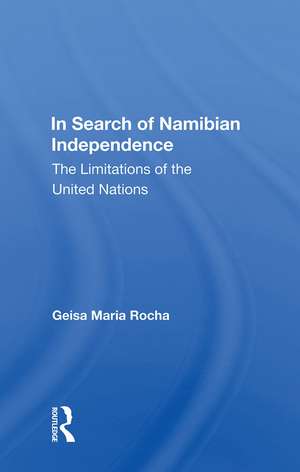In Search Of Namibian Independence: The Limitations Of The United Nations
Autor Geisa Maria Rochaen Limba Engleză Hardback – 7 iun 2019
Preț: 764.20 lei
Preț vechi: 1027.40 lei
-26% Nou
Puncte Express: 1146
Preț estimativ în valută:
146.32€ • 150.09$ • 123.19£
146.32€ • 150.09$ • 123.19£
Carte tipărită la comandă
Livrare economică 26 februarie-12 martie
Preluare comenzi: 021 569.72.76
Specificații
ISBN-13: 9780367017279
ISBN-10: 036701727X
Pagini: 204
Dimensiuni: 152 x 229 mm
Greutate: 0.45 kg
Ediția:1
Editura: Taylor & Francis
Colecția Routledge
Locul publicării:Oxford, United Kingdom
ISBN-10: 036701727X
Pagini: 204
Dimensiuni: 152 x 229 mm
Greutate: 0.45 kg
Ediția:1
Editura: Taylor & Francis
Colecția Routledge
Locul publicării:Oxford, United Kingdom
Cuprins
Westview Replica Editions -- Introduction -- The United Nations and the Maintenance of International Peace and Security -- Namibia, the United Nations, and the Wasted Years, 1946–1966 -- Namibia: A Unique United Nations Responsibility? 1966–1976 -- Intervention of the Five Western Countries: Alternative to the United Nations Action? -- Conclusions -- Postscript -- United Nations General Assembly Resolution A/RES/2145 of 26 September 1966 -- United Nations General Assembly Resolution A.RES.2248 (S-V) of 19 May 1967 -- Resolution 385 (1976) -- Resolution 435 (1978)
Descriere
Focusing on the Namibian issue and how it has been handled in the United Nations since 1945, this book discusses the limitations of the UN as a political institution and assesses its ability to manage crises and control conflicts. The UN was established to help maintain international peace and security; since its founding, however, the independence and sovereignty of member states has come to take precedence over the organization's original goals. As a result, contends Ms. Rocha, the UN may be viewed as a passive arena where political actors pursue their policies and priorities in response to the larger realities and forces governing world politics. In the case of Namibia, the UN simply cannot take significant action in expelling the illegal South African administration without the support of the few powerful members who provide it with resources. She concludes that the liberation of Namibia rests ultimately with the Namibian people themselves and the ability of SWAPO to intensify its armed struggle, thereby causing South Africa to consider its presence in Namibia more a liability than an asset.
